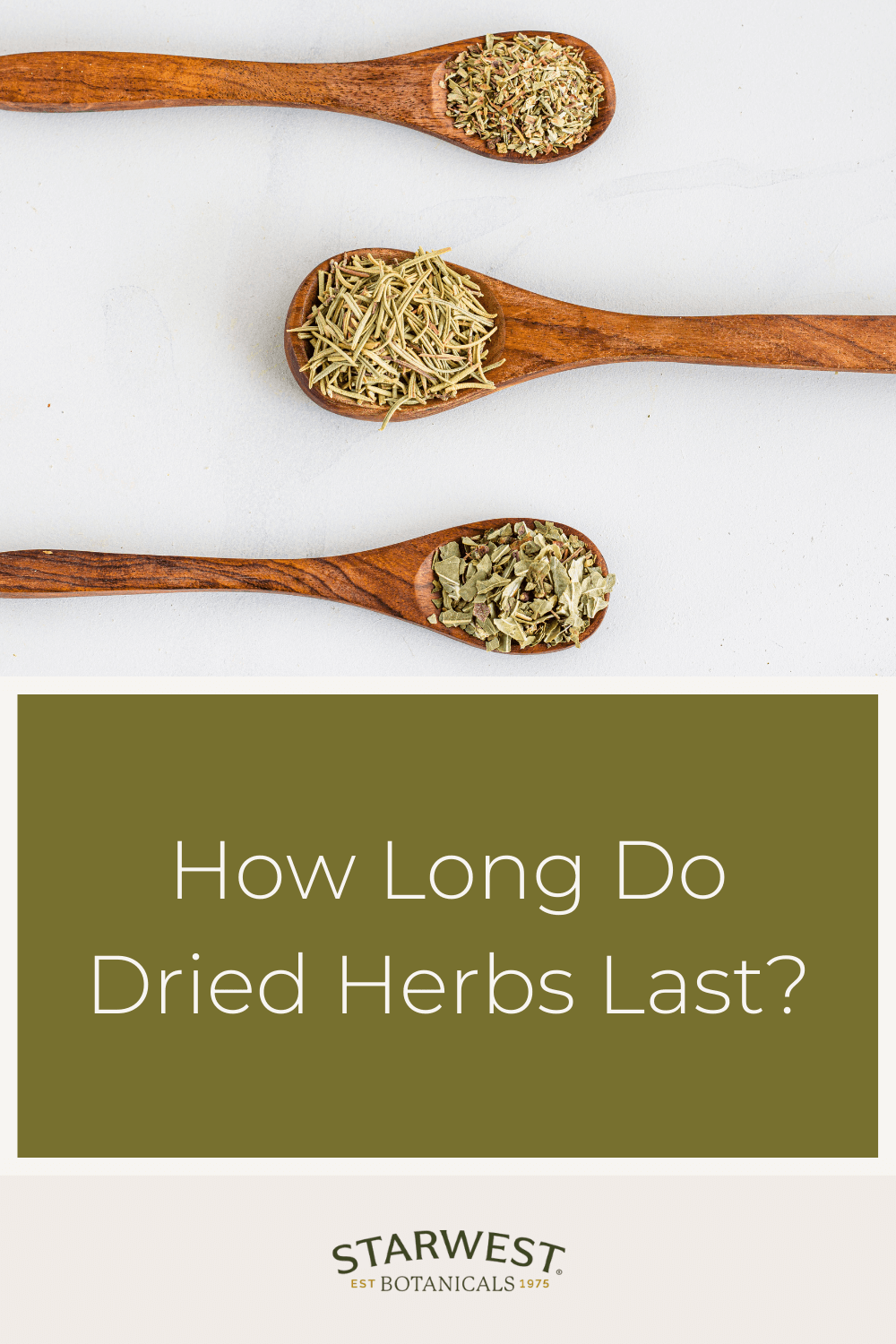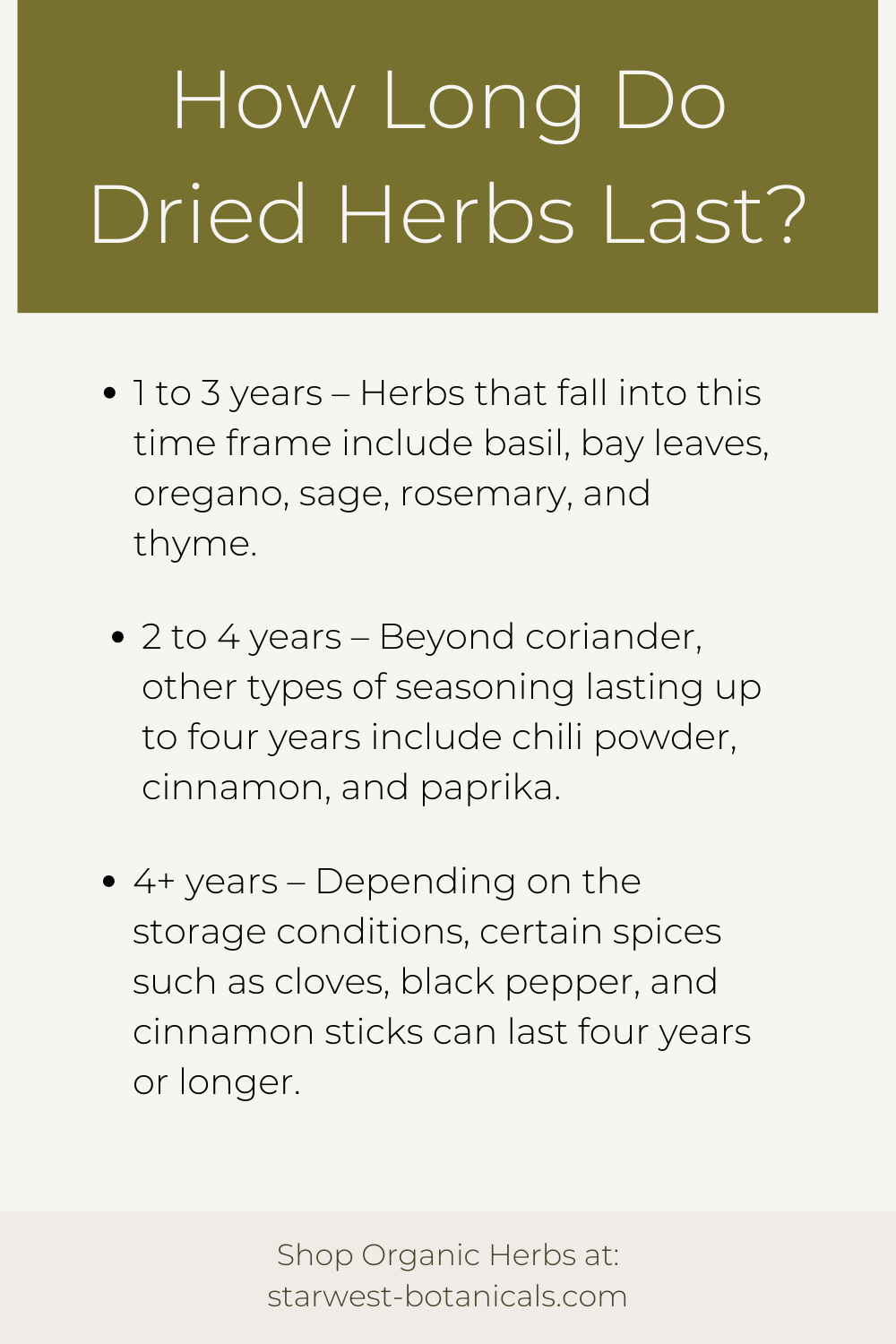How Long Do Dried Herbs Last? | Starwest Botanicals
Posted by Starwest Botanicals on 11-15-2022

With herbs and spices, a little goes a long way. A dash of ginger adds richness and depth to your dish, while too much can overshadow other flavors. But if you’ve been using the same jar of sage for the past six months without hardly making a dent in it, you may be wondering—just how long do dried herbs last?
There’s no exact answer, but most dried herbs and spices will last at least a year, with the average being two or three years. However, it’s not always that simple. For example, how long do dried spices last? Are they different from fresh herbs?
Read on to learn about the shelf life of dried herbs and ground spices. We’ll cover a few telltale signs your spice rack is going bad and offer tips to help you prolong the lifespan of your precious seasoning.
Shelf Life 101
If you’ve just pulled your long-lost coriander out of your spice blend cabinet, don’t be in a hurry to toss it away. Chances are it’s still fresh. The fact is that most dried herbs and spices have relatively long shelf lives—coriander, especially, which lasts between three and four years!
After all, one of the advantages of dried herbs is their convenient, easy, long-term storage and long-lasting flavor.
When figuring out the shelf life of your spices and herbs, consider the following factors:
- Spice vs. herb – Generally, dried spices sit on the shelf longer than dried herbs, with spices lasting two to three years and herbs lasting one to three years. What’s the difference? Herbs—like basil and sage—consist of plant leaves, whereas spices—such as cinnamon and paprika—come from the rest of the plant, including the root, stem, or seed.
- Whole vs. powdered – To buy whole cloves or ground cloves—that is the question. While both versions come with unique benefits, a rule of thumb is that whole spices and herbs tend to last longer. Those ground cloves may be more exposed to the elements, while whole herbs and spices tend to keep their flavors locked tightly inside.
- Salted vs. unsalted – Whether it’s salted herbs or herb-infused salt, this mineral compound is a natural preservative and will keep your ground herbs and spices from spoiling. That being said, you may still find your seasoning loses its flavor, becoming more mild over time.
Shelf Lives of Common Seasoning Types
Now that you understand various factors affecting shelf life, let’s dive into the specifics of certain herbs and spices. Consider the following household seasonings categorized by length of time:
- 1 to 3 years –Herbs that fall into this time frame include basil, bay leaves, oregano, sage, rosemary, and thyme. Try to use these herbs more by keeping them in the front of your spice cabinet where you’re more likely to see them and get inspiration for your next dish.
- 2 to 4 years – Beyond coriander, other types of seasoning lasting up to four years include chili powder, cinnamon, and paprika.
- 4+ years – Depending on the storage conditions, certain spices such as cloves, black pepper, and cinnamon sticks can last four years or longer. That’s also why it’s important to invest in a quality spice or herb—you can be sure it’ll stick around.
Learn the Signs of Expired Spices
Do dried herbs go bad? If so, how can you tell?
The short answer is yes and no. Unlike other foods in your pantry or cupboard, dried spices and immune boosting herbs don’t “go bad” in an obvious way by rotting or turning moldy. However, over time, they can lose their potency. Maybe your cinnamon doesn’t have the same sharpness, or your sage is lacking that distinct herbaceous aroma.
If you’re determining whether or not to replace your herbs and spices, pay attention to the following signs:
- Sell-by date – The first thing to notice is the sell-by date on your herb’s container. While most herbs and spices can last far past this printed date, it’s an accurate representation of how long your seasoning will stay its strongest. This is a helpful starting benchmark. For example, if you’re dusting off your rosemary and it’s years past the sell-by date, you might be in the market for a new jar.
- Smell test – When it comes to herbs and spices, this is the only way you can truly determine their freshness. To test the potency, shake a small amount of the seasoning into your hand and rub it around thoroughly. If you take a whiff and the fresh herb or fresh spice still smells faint, take that as a sign that it’s time to replace it.
How to Repurpose Old Seasoning
You’ve finally gotten to your spice rack as part of spring cleaning, and you’re realizing that most of your herbs and spices are past their prime. It happens—but there’s no need to despair. Old herbs and spices still carry that delicious scent and flavor, just not as much as before.
While your seasoning may not be potent enough for cooking, those spices and herbs can still be put to good use in a variety of ways. Before you toss that lovely seasoning in the trash, consider the following ideas:
- Make your own incense – From diffusers to potpourri, use your old spices and herbs to make personalized incense for the home. Create a warm, holiday atmosphere with nutmeg and cinnamon, a forest scent with thyme and rosemary, or added freshness with a dash of minty sage.
- Keep away the critters – You may love the aromatic smell of herbs and spices, but insects and pests sure don’t. Keep old bay leaves, basil, rosemary, and thyme around the house to repel critters during the warmer months. Consider scattering your seasoning in the corners of the house, around the bed, or near the doorways.
- Deodorize with aromatic sachets – Whether your home is longing for a fresher scent or you just want to shake things up, create your own spice mix and distribute it into sachets—small porous cloth bags—to hang up around your place. Not sure where to start? Try minty spices and herbs such as oregano or sage.
- Use double the quantity – If you’re in that limbo stage—the seasoning isn’t as fresh as before but not completely stale either—don’t give up so quickly on your spices and herbs. Rather than repurpose them immediately, use them in greater quantities when you’re cooking to achieve the same potency. This is a clever way to use up your seasoning more quickly before it completely loses its freshness.

Aim for Longevity
While it can be enjoyable and beneficial to repurpose seasoning, the best case scenario is if those spices and herbs hang on for longer. The good news is that you can maximize the freshness of your spice rack with just a few simple steps.
Step 1: Store Properly
It is important to learn how to store dried herbs because it differs for dried vs fresh herbs. Proper storage is the first and most important step in keeping your herbs and spices fresh. Without ensuring an optimal environment for your seasoning, you’ll leave them exposed to elements such as heat and moisture, causing the delicious oils and flavors to break down. In particular, consider the following storage tips:
- Keep it cool and dark – Keep your herbs and spices as dry as you can to ensure they stay fresh. That’s why a pantry or cupboard is an ideal storage option. Avoid hot areas such as the stove, which can accelerate the breakdown of your seasoning.
- Use an airtight container – Preventing moisture from touching your herbs and spices is key to making them last longer. Rather than shaking your herb jar directly over a hot dish, pour the seasoning into your hand to avoid the steam.
Step 2: Stay Organized
An organized spice cabinet is an efficient spice cabinet. When your collection stays neat and tidy, you’re more likely to use up your herbs and spices before they expire. It’s particularly important to introduce visual cues that will help you keep track of how long the seasoning has been around.
Consider the following for examples of such reminders:
- Rotate through your spice cabinet on a weekly or monthly basis, bringing rarely used spices to the front so you’re more likely to remember them.
- Arrange your seasoning chronologically, placing older spices at the front to remind yourself to use them.
- Label each herb and spice with a sticky note detailing the date it was opened to keep a closer watch on spices that have been open for a while.
Step 3: Visit a Specialty Store
Let’s face it—high quality herbs can make all the difference when spotlighting flavors in a recipe. For tastes and smells that leave a long-lasting impression, visit a store that specializes in top-notch herbs and spices. Build your spice blend rack on a solid foundation by starting with higher-quality material.
Specialty stores tend to offer more potent medicinal herbs and spices due to the following reasons:
- They tend to be purer and contain fewer added ingredients.
- They’re often derived straight from the source and are organically grown.
Starwest Botanicals: Spice Up Your Life with Our Premium Organic Botanicals
If you’re looking to elevate your herb collection, browse our collection of organic herbs to find the perfect addition to your spice cabinet. With a wide range of offerings, from sweet-smelling lavender to spicy anise, our bulk herbs and spices can satisfy all your aromatic needs.
At Starwest, the use of our spices and herbs isn’t just limited to the kitchen. Try out our 100% pure essential oils in your diffuser or opt for natural body care products, including Herbal Bath Blends and delicious Flower Waters.
No matter your preferences, all of our products are crafted with the same rigorous standards—transparent and traceable sourcing from end to end.
Sources:
Healthline. Do Spices Expire? Shelf Life and When to Toss Them. https://www.healthline.com/nutrition/do-spices-expire
Still Tasty. Food Storage - How Long Can You Keep Coriander? https://www.stilltasty.com/fooditems/index/16957#:~:text=How%20long%20does%20ground%20coriander%20last%20at%20room%20temperature%3F,containers%20with%20tight%2Dfitting%20lids.
Still Tasty. How Long Do Spices Last?https://www.stilltasty.com/articles/view/67
Almanac. What is the Difference Between Spices and Herbs?https://www.almanac.com/what-difference-between-spices-and-herbs#:~:text=An%20herb%20is%20the%20green,%2C%20star%20anise%2C%20and%20tumeric.
Today. Are your spices really old? 3 signs it's time to throw them away. https://www.today.com/food/are-your-spices-old-here-s-how-tell-if-you-t125844
Express. Can herbs and spices expire or go bad?https://www.express.co.uk/life-style/food/1419611/Can-herbs-spices-expire-go-bad-dried-seasoning-evg
Wonder How To. Are Your Herbs & Spices Too Old? Here's How to Check. https://food-hacks.wonderhowto.com/how-to/are-your-herbs-spices-too-old-heres-check-0169844/
Real Simple. 6 Ways You Can Use Your Expired Spices. https://www.realsimple.com/food-recipes/shopping-storing/expired-spices
Turning the Clock Back. What To Do With Old Spices After They Expire. https://www.turningclockback.com/what-to-do-with-old-spices-after-they-expire/
Bon Appetit. Do Spices Go Bad? Well, Yeah, Kind of. https://www.bonappetit.com/story/do-spices-go-bad



